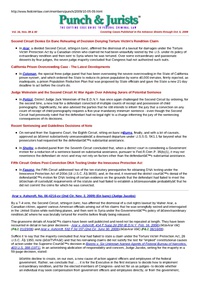In an appeal from an order sentencing defendant, after a fifteen-year delay, to a one-day term of imprisonment and three years of supervised release with a special condition that she serve six months in a halfway house, the order is vacated where: 1) the Speedy Trial Clause of the …
In a 288-page opus entitled U.S. v. Polizzi, 549 F.Supp.2d 308 (E.D.N.Y. April 1, 2008) (P&J, 03/03/09) (“Polizzi I”), District Judge Jack Weinstein of the E.D.N.Y. initiated another of his frequent and protracted sentencing squabbles with the Second Circuit by vacating defendant Peter Polizzi’s twelve convictions for the receipt …
Sentence for receipt of child pornography is affirmed where the district court did not err in imposing a four-level enhancement for the possession of images containing sadistic or masochistic conduct, as the court made an objective determination that the image depicted sexual activity involving a minor and the depicted …
Defendant's money laundering convictions are reversed where, although the government had abundant evidence of defendant's khat-related activities, the circumstantial evidence that the government presented did not support an inference that his proceeds were the result of the importation of cathinone. Other drug and conspiracy convictions are vacated where the …
In addition to sentence reductions for substantial assistance based on U.S.S.G. § 5K1.1, Rule 35(b)of the Fed.R.Crim.P. addresses two other types of Government motions to reduce a defendant’s sentence based upon substantial assistance. Rule 35(b)(1) covers motions made by the Government within a year after sentencing; while Rule 35(b)(2) …
On Sept. 23, 2001, President Bush signed an Executive Order (“EO 13224"), in which he designated 27 groups and individuals, including the Humanitarian Law Project (“HLP”), as “specially designated global terrorists” (“SDGTs”). As a result of that designation, the assets of each of those SDGTs were frozen. HLP, a …
For years it has been an open secret that the prison system in the State of California has been in a “state of emergency” due to serious overcrowding. Yet, despite numerous studies that have shown that conditions in the entire correctional system have become chaotic, the State has been …
Here a divided en banc Court affirmed the dismissal of a lawsuit under the Torture Victim Protection Act by a Canadian who was unlawfully seized by the U.S. and sent to Syria under its policy of extraordinary rendition where he was tortured.
By a 7-4 vote, the Second …
Here, on remand from the Supreme Court, the Eighth Circuit finally approved as “not substantively unreasonable” a downward departure under U.S.S.G. 5K1.1 far beyond what the prosecutors had requested for the defendant’s assistance.
This lengthy decision and the Seventh Circuit’s decision in U.S. v. Shelby, 584 F.3d 743 …
Here the Court addressed two of the ten statutory prerequisites for obtaining DNA testing under the Innocence Protection Act of 2004 (18 U.S.C. § 3600), namely § 3600(a)(4) (chain of custody) and § 3600(a)(8) (reasonable probability of innocence).
This decision case addresses two of the provisions of the …
[Editor's Note: For some commentaries on this decision, see:
• "Second Circuit panel advocates 'more flexible approach' to tough guideline determinations," by Prof. Doug Berman, as posted on Sentencing Law and Policy on Aug. 18, 2009 at http://sentencing.typepad.com/sentencing_law_and_policy/2009/08/second-circuit-panel-advocates-more-flexible-approach-to-tough-guideline-determinations.html.
Defendant's securities fraud conviction is affirmed, where the Double Jeopardy Clause did not apply to defendant's retrial because he himself moved for a mistrial. However, his sentence is vacated where the district court made insufficient findings regarding defendant's role in the conspiracy for sentencing purposes.
[Editor's Note: For some …
Defendant's Racketeer Influenced and Corrupt Organizations Act conviction is affirmed where, even though the predicate acts proved by the government were outside the statute of limitations, other trial evidence permitted the jury to conclude that both the charged racketeering conspiracy and Defendant’s membership in it continued into the limitations …
Defendant's sentence for illegally reentering the U.S. following removal is vacated where criminal possession of a weapon in the second degree, in violation of N.Y. Penal Law § 265.03, is not a crime of violence for the purposes of Sentencing Guidelines § 2L1.2(b)(1)(A)(ii).
[Editor's Note: For a commentary on …
In an appeal from a district court order granting an application by a newspaper to access sealed wiretap applications relating to the investigation of a prostitution ring, the order is reversed where: 1) petitioner did not show good cause to unseal the wiretap-related documents pursuant to Title III of …
